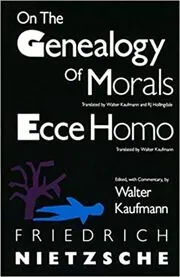On the Genealogy of Morals and Ecce Homo Summary
Author: Friedrich Nietzsche
This page offers our On the Genealogy of Morals and Ecce Homo summary (Friedrich Nietzsche's book). It opens with an overview of the book, and follows with a concise chapter-by-chapter summary.
Drafted with AI assistance and reviewed by a human editor.
As an Amazon Associate, we earn from qualifying purchases (at no extra cost to you).
This book has 3 recommenders!
Overview
The collection of three essays delves into the exploration and criticism of our moral judgements, based on a method that scrutinizes the origins and implications of our various moral notions.
The first treatise contrasts two types of morality, namely "master morality" and "slave morality". The former was established by the robust, independent and content individuals who considered their own happiness as a virtue and labeled it as such. They perceived the frail, unhealthy, and subjugated individuals as "inferior" due to their undesirable weakness. Meanwhile, the oppressed slaves perceived their joyous and prosperous oppressors as "wicked" and, in contrast, deemed themselves as virtuous.
The second analysis deals with concepts such as guilt and remorse. It traces the origins of these ideas, demonstrating that they initially did not stem from any moral transgressions. Originally, guilt signified an outstanding debt, and punishment was merely a way to ensure repayment. These moral concepts only gained their current connotations with the emergence of slave morality. The so-called "bad conscience" is characterized by our inclination to perceive ourselves as culprits. It originated from the societal need to suppress our inherent aggressive and cruel instincts and to internalize them. The final essay tackles asceticism, a dominant and paradoxical force in modern life. It is perceived as the manifestation of a feeble, ailing will. As it grapples with internal conflict, the weak will views its natural instincts and earthly nature as reprehensible and vile. Unable to liberate itself from these instincts, it strives to control and domesticate itself as much as possible. The conclusion drawn is that humans would prefer to will nothingness than to not have a will at all.
Edited by
Software engineer whose passion for tracking book recommendations from podcasts inspired the creation of MRB.
Lead investor at 3one4 Capital whose startup expertise and love for books helped shaped MRB and its growth.







Comments
Did we miss something? Have feedback?
Help us improve this page by sharing your thoughts